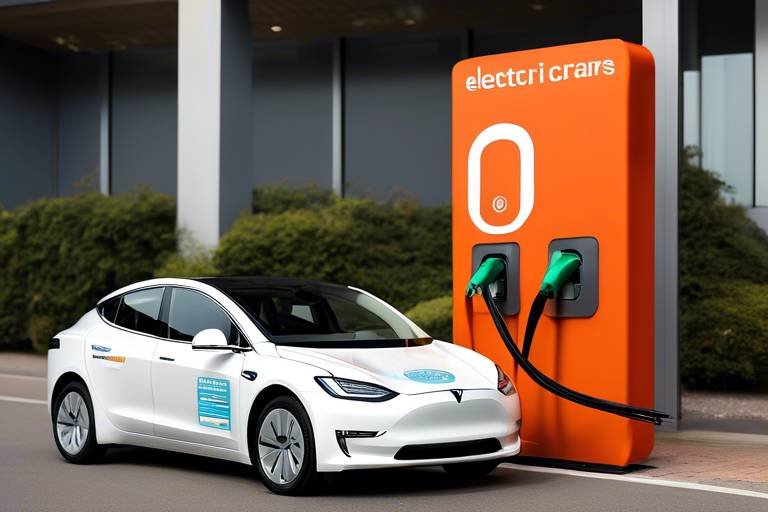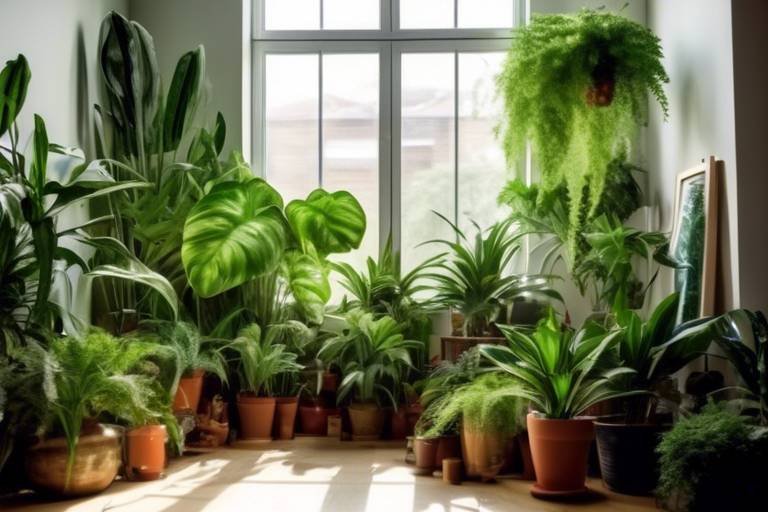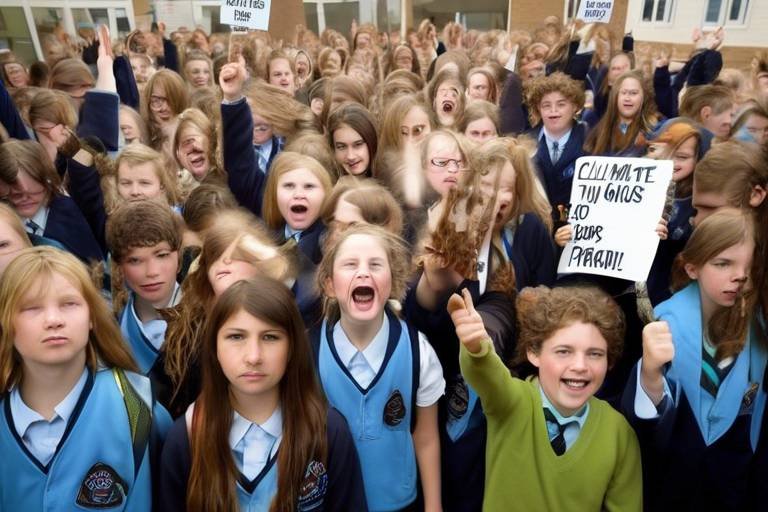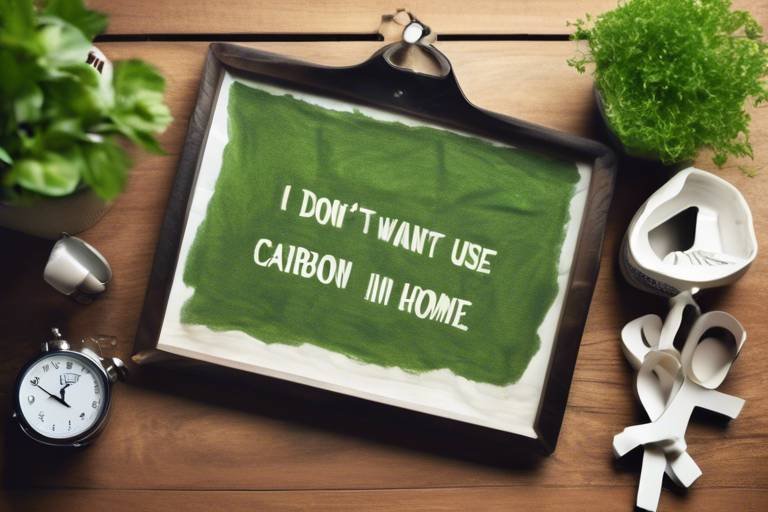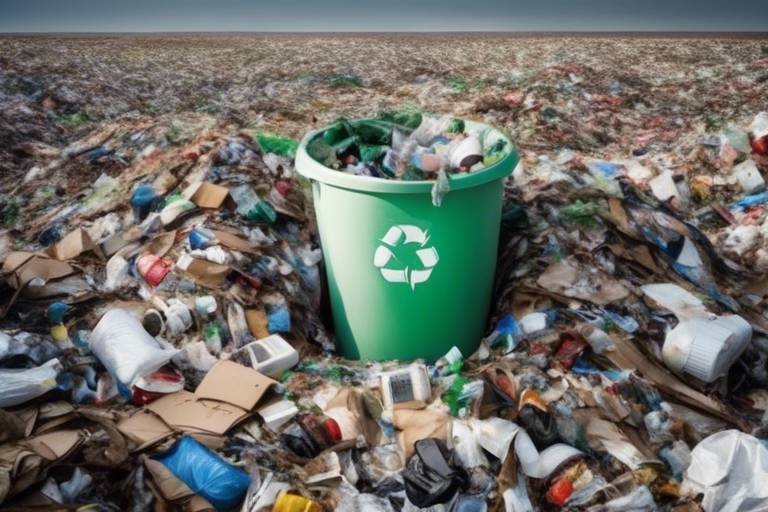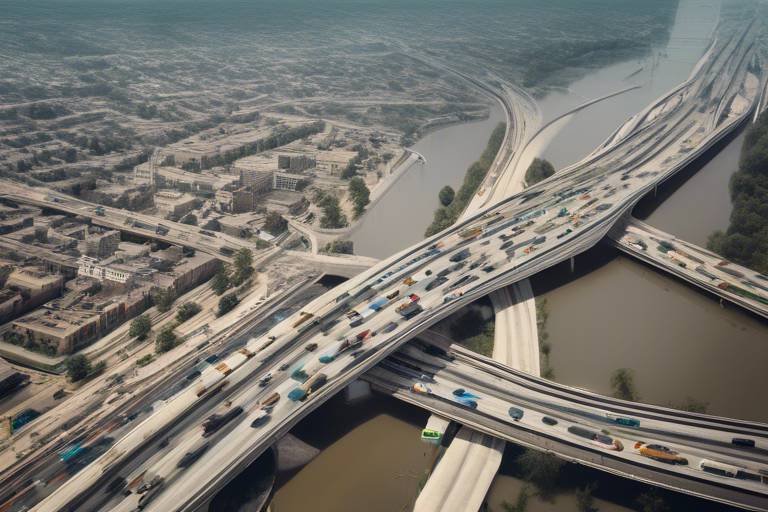The Importance of Water Conservation in a Changing Climate
Water is often referred to as the lifeblood of our planet. It sustains life, supports ecosystems, and is essential for agriculture and industry. However, as climate change intensifies, the availability of fresh water is becoming increasingly uncertain. This article explores the critical role of water conservation in mitigating the impacts of climate change, highlighting strategies, benefits, and the necessity for collective action to ensure sustainable water resources for future generations.
Water scarcity is a growing global issue exacerbated by climate change. It is not just about the lack of water; it’s about the inequitable distribution of this precious resource. Factors such as population growth, pollution, and changing weather patterns contribute to this dire situation. According to the United Nations, approximately 2 billion people live in countries experiencing high water stress. The consequences are severe: agricultural yields decline, ecosystems suffer, and communities face conflict over dwindling resources. This section delves into the causes and consequences of water scarcity, emphasizing the urgent need for effective conservation measures.
Water conservation is not merely an environmental imperative; it also offers a plethora of economic and environmental benefits. By adopting water-saving practices, individuals and communities can enhance their resilience against climate change while preserving vital ecosystems. The advantages of conserving water extend beyond just saving this vital resource. They include:
- Reduced Utility Bills: Less water usage directly translates to lower costs on your water bill.
- Improved Local Economies: Water-efficient practices can stimulate local economies by reducing costs for businesses and households alike.
- Enhanced Ecosystem Health: Conserving water helps maintain healthy habitats and supports biodiversity.
Conserving water leads to reduced utility bills and lower infrastructure costs. For example, when households implement water-saving technologies, they can see a significant drop in their monthly expenses. This subsection explores how water-saving practices can positively affect household budgets and local economies. In fact, studies have shown that for every 1% reduction in water consumption, there is a corresponding decrease in treatment and delivery costs, benefiting both the consumer and the municipality.
Implementing water-efficient technologies can significantly reduce expenses. Simple changes like installing low-flow faucets, fixing leaks, or using rain barrels can save gallons of water daily. Here are some cost-effective solutions that individuals and businesses can adopt to save water and money:
- Install dual-flush toilets to minimize water waste.
- Utilize xeriscaping techniques in landscaping to reduce outdoor water use.
- Use smart irrigation systems that adjust watering schedules based on weather conditions.
Investing in water conservation initiatives can create jobs in various sectors. From engineering to environmental science, promoting water management practices can contribute to economic growth and employment opportunities. As communities invest in upgrading their water systems and promoting conservation, they not only protect their resources but also foster job creation in the process.
Water conservation plays a crucial role in protecting ecosystems and biodiversity. When water is conserved, it helps maintain healthy habitats that are essential for wildlife. For instance, wetlands, rivers, and lakes thrive when their water levels are stable, supporting countless species. By saving water, we are not just preserving a resource; we are also safeguarding our planet's natural heritage.
Effective water conservation requires a variety of strategies at individual, community, and governmental levels. This section outlines practical approaches to reduce water usage in daily life. From simple habit changes to large-scale initiatives, every action counts. For individuals, simple daily practices can have a big impact. For communities, collaborative programs can foster a culture of conservation.
Individuals can make a significant impact through simple changes in habits. Here are some actionable tips for reducing water consumption at home and in the garden:
- Take shorter showers and turn off the tap while brushing your teeth.
- Collect rainwater for watering plants.
- Use a broom instead of a hose to clean driveways and sidewalks.
Community-led water conservation programs can foster collective responsibility. Engaging local residents in water-saving initiatives not only raises awareness but also empowers them to make a difference. Successful initiatives can include community workshops, water audits, and local challenges that encourage everyone to participate in conserving water.
Innovative technologies play a vital role in enhancing water conservation efforts. From smart meters that track water usage to advanced irrigation systems that optimize water delivery, technology is revolutionizing how we manage our water resources. This section discusses advancements that help monitor, manage, and reduce water usage effectively, ensuring that every drop counts.
Q: Why is water conservation important?
A: Water conservation is crucial for ensuring sustainable water resources, protecting ecosystems, and mitigating the impacts of climate change.
Q: How can I conserve water at home?
A: Simple practices such as fixing leaks, using water-efficient appliances, and reducing shower time can significantly lower water consumption.
Q: What are the economic benefits of water conservation?
A: Conserving water can lead to lower utility bills, reduced infrastructure costs, and job creation in water management sectors.
Q: How can communities work together to conserve water?
A: Communities can collaborate through workshops, challenges, and local programs that promote water-saving practices.

Understanding Water Scarcity
Water scarcity is not just a buzzword; it’s a pressing reality that affects millions around the globe. As our planet warms due to climate change, the availability of clean, fresh water is diminishing at an alarming rate. This scarcity is driven by a variety of factors that intertwine like a tangled web, making it essential to understand the root causes and their consequences. Imagine living in a world where turning on the tap yields nothing but air; that’s the stark future many communities face if we don’t take action now.
One of the primary causes of water scarcity is the changing climate itself. Rising temperatures lead to increased evaporation rates, which means that even when it rains, a significant amount of water is lost before it can be used. Additionally, changing weather patterns can result in prolonged droughts in some areas while others may experience devastating floods. This inconsistency makes it increasingly difficult to rely on traditional water sources.
But it’s not just climate change that is exacerbating the situation. Rapid urbanization and population growth are also significant contributors. As cities expand, the demand for water skyrockets, often outpacing the supply. This is particularly alarming in developing countries, where infrastructure may not be equipped to handle the increased demand. Furthermore, agricultural practices play a critical role. Agriculture consumes about 70% of the world's fresh water, and inefficient irrigation methods can lead to significant wastage.
The consequences of water scarcity are dire and multifaceted. Not only does it jeopardize drinking water supplies, but it also threatens food security and economic stability. When farmers can’t access enough water for irrigation, crop yields decline, leading to food shortages and increased prices. This cycle of scarcity can even lead to social unrest and conflict over dwindling resources.
To better understand the severity of water scarcity, let’s take a look at some statistics:
| Region | Population Affected by Water Scarcity (%) | Projected Water Shortage by 2030 (billion cubic meters) |
|---|---|---|
| Sub-Saharan Africa | 40% | 17 |
| Middle East & North Africa | 60% | 20 |
| South Asia | 30% | 14 |
These figures are not just numbers; they represent lives affected and futures compromised. The urgent need for effective conservation measures cannot be overstated. As individuals, communities, and nations, we must come together to tackle this crisis. By understanding the causes and consequences of water scarcity, we can better appreciate the importance of conserving this vital resource. It’s time to act, not just for ourselves but for future generations who deserve to live in a world where clean water is abundant.

Benefits of Water Conservation
Water conservation is more than just a trendy buzzword; it’s a fundamental practice that can lead to a plethora of benefits for individuals, communities, and the environment. As we navigate through a world increasingly affected by climate change, understanding the advantages of conserving water becomes essential. Not only does it help in preserving our precious natural resources, but it also offers significant economic and environmental benefits that can enhance our quality of life.
One of the most immediate benefits of water conservation is the **economic impact** it has on households and communities. By adopting water-saving techniques, families can see a noticeable decrease in their utility bills. Imagine cutting down your monthly water expenses just by being mindful of your usage! For example, simple changes like fixing leaks, using water-efficient appliances, and being conscious of how much water you use when washing dishes or showering can lead to substantial savings over time. This not only lightens the financial load on families but also decreases the overall demand on municipal water systems, which can lead to lower infrastructure costs for communities.
When we talk about the economic impacts of water conservation, it’s essential to consider the broader picture. Reducing water consumption can lead to a ripple effect that benefits local economies. For instance, when households save money on their water bills, they often have more to spend on other goods and services, stimulating local businesses. Furthermore, water conservation initiatives can lead to job creation within the water management sector. As communities invest in sustainable practices and technologies, new positions emerge, ranging from water management specialists to environmental engineers. This not only contributes to economic growth but also fosters a sense of community as people come together to work towards a common goal.
Implementing cost-effective solutions for water conservation can be a game changer. Technologies such as low-flow showerheads, dual-flush toilets, and smart irrigation systems are just a few examples of how individuals and businesses can save both water and money. According to recent studies, households that use water-efficient fixtures can save up to **30%** on their water bills! Just think about what you could do with that extra cash. Investing in these technologies not only pays off in the short term but also contributes to long-term sustainability.
Moreover, the push for water conservation can lead to a significant increase in job opportunities. As communities recognize the importance of sustainable water practices, they often seek professionals who can help implement these strategies. This includes roles in education, where individuals can teach others about the importance of water conservation, as well as technical positions that focus on developing and maintaining efficient water systems. The creation of jobs in this sector not only aids in economic recovery but also promotes a culture of sustainability that benefits everyone.
Beyond the economic advantages, the environmental benefits of water conservation cannot be overstated. When we conserve water, we are actively participating in the protection of our ecosystems. Water is the lifeblood of our planet, and by using it wisely, we help maintain healthy habitats for countless species. For instance, conserving water reduces the need for excessive water extraction from rivers and lakes, which can lead to habitat destruction and loss of biodiversity. Additionally, less water usage means fewer wastewater discharges, which helps keep our waterways clean and supports wildlife.
In conclusion, the benefits of water conservation are vast and varied, impacting not just our wallets but also our communities and the environment. By embracing water-saving practices, we not only secure our water resources for future generations but also enhance our quality of life today. It’s a win-win situation that calls for collective action and awareness. So, let’s take this opportunity to become stewards of our water resources and make a positive change!
- Why is water conservation important? Water conservation is crucial for preserving our natural resources, reducing utility bills, and protecting ecosystems.
- How can I conserve water at home? Simple steps include fixing leaks, using water-efficient appliances, and being mindful of water usage in daily activities.
- What are the economic benefits of water conservation? Water conservation can lead to reduced utility bills, lower infrastructure costs, and job creation in water management.
- How does water conservation benefit the environment? It helps maintain healthy ecosystems, reduces habitat destruction, and keeps waterways clean.

Economic Impacts
When we think about water conservation, the first thing that often comes to mind is the environmental benefits. However, we can't overlook the significant that come with conserving this precious resource. Imagine your monthly utility bill—what if you could slash that by simply being mindful of how you use water? By implementing water-saving practices, households can experience a noticeable reduction in their expenses. Not only does this lighten the financial load on families, but it also contributes to a more sustainable economy overall.
Moreover, the economic implications extend beyond just individual savings. Communities that prioritize water conservation can see a ripple effect in their local economies. For instance, when water is conserved, it reduces the strain on municipal water systems, leading to lower infrastructure costs for local governments. This means that funds can be redirected towards other essential services like education or healthcare, enhancing the quality of life for everyone.
But wait, there's more! Investing in water-efficient technologies doesn't just save money; it also opens up new avenues for job creation. As businesses and households adopt these technologies, there’s an increasing demand for skilled professionals to install and maintain them. This can lead to a surge in job opportunities in sectors such as plumbing, engineering, and environmental science. In fact, a recent study highlighted that every dollar invested in water conservation can yield a return of up to $3 in economic benefits. That’s a win-win situation!
To illustrate this point further, let’s take a look at a simple table that summarizes the economic benefits of water conservation:
| Benefit | Description |
|---|---|
| Reduced Utility Bills | Lower monthly expenses for households and businesses. |
| Lower Infrastructure Costs | Less strain on municipal systems, freeing up funds for other services. |
| Job Creation | Increased demand for skilled workers in water management and technology sectors. |
| Economic Growth | Every dollar invested in water conservation can yield significant returns. |
In conclusion, the economic impacts of water conservation are profound and multifaceted. By adopting simple water-saving measures, we not only protect our environment but also enhance our financial well-being and contribute to the economic vitality of our communities. So, the next time you turn off the tap while brushing your teeth, remember that you’re not just saving water—you’re also saving money and supporting a sustainable economy!
- Why is water conservation important for the economy? Water conservation helps reduce utility costs, minimizes infrastructure expenses, and creates job opportunities in various sectors.
- How can individuals contribute to water conservation? Simple actions like fixing leaks, using water-efficient appliances, and being mindful of water usage can make a big difference.
- What are some economic benefits of investing in water-efficient technologies? Investing in these technologies can lead to lower bills, job creation, and improved local economic conditions.
- Can water conservation efforts impact local businesses? Yes, by reducing costs and promoting sustainability, businesses can thrive in a community that values resource conservation.

Cost-Effective Solutions
When it comes to conserving water, the idea of spending money to save money might seem like a paradox, but the truth is, there are numerous that can not only help you save water but also reduce your expenses over time. Think of it like investing in a good pair of shoes; while you may spend a little more upfront, the comfort and durability will pay off in the long run. By implementing smart water-saving technologies and practices, both individuals and businesses can see significant financial benefits.
One of the most effective ways to start saving water is by installing water-efficient fixtures. For instance, low-flow showerheads and faucets can drastically reduce water usage without compromising performance. According to the Environmental Protection Agency (EPA), these simple upgrades can save a family of four more than 20,000 gallons of water annually. Imagine what you could do with that extra cash in your pocket! Additionally, consider dual-flush toilets, which allow users to choose between a full or partial flush, further conserving precious water.
Beyond fixtures, rainwater harvesting systems are becoming increasingly popular. These systems collect and store rainwater for non-potable uses, such as irrigation and toilet flushing. While the initial setup may require some investment, the long-term savings on water bills can be substantial. In fact, many homeowners report cutting their water bills by up to 50% after installing a rainwater collection system. If you live in an area with regular rainfall, this could be a game-changer for your household budget!
Moreover, businesses can benefit from water-efficient landscaping, often referred to as xeriscaping. This approach uses drought-resistant plants and smart irrigation techniques to minimize water usage. Not only does this save water, but it also reduces landscaping costs. In a world where every penny counts, adopting such practices can lead to substantial savings over time.
Here’s a quick breakdown of some cost-effective solutions:
| Solution | Estimated Savings | Initial Cost |
|---|---|---|
| Low-flow showerheads | 20,000 gallons/year | $20 - $100 |
| Dual-flush toilets | 20% less water per flush | $150 - $300 |
| Rainwater harvesting system | Up to 50% reduction in water bills | $1,000 - $3,000 |
| Xeriscaping | 30% reduction in landscape watering | Varies |
In addition to these solutions, there are numerous government incentives and rebate programs designed to encourage water conservation. Many local governments offer financial assistance for homeowners who install water-saving devices or systems. This means that not only can you save money through reduced water bills, but you might also receive a little help from your community to get started.
In conclusion, embracing cost-effective solutions for water conservation is a win-win scenario. Not only do these strategies help protect our most vital resource, but they also empower individuals and businesses to save money in the process. So why wait? Start exploring these options today and watch your savings grow while doing your part for the planet!
Q: What are the most effective ways to save water at home?
A: Some effective methods include installing low-flow fixtures, fixing leaks promptly, using water-efficient appliances, and practicing mindful water usage, such as shorter showers and turning off the tap while brushing your teeth.
Q: Are there any financial incentives for water conservation?
A: Yes! Many local governments and utility companies offer rebates and incentives for homeowners who implement water-saving technologies and practices. Check with your local water authority for specific programs available in your area.
Q: How can I encourage my community to participate in water conservation?
A: Organizing community workshops, sharing information on social media, and collaborating with local organizations can help raise awareness about the importance of water conservation. You can also start or join a community garden that focuses on sustainable practices.

Job Creation in Water Management
Investing in water conservation initiatives is not just about saving our precious resources; it also has a significant impact on the economy by creating jobs across various sectors. As the demand for sustainable water management solutions rises, so does the need for skilled professionals who can implement these strategies effectively. The water management sector encompasses a wide range of job opportunities, from engineers and scientists to community organizers and policy advocates. By focusing on water conservation, we can stimulate job growth in several key areas:
- Engineering and Infrastructure Development: Engineers are essential for designing and implementing water-efficient systems, such as advanced irrigation techniques and wastewater treatment facilities. Their expertise ensures that we can maximize water use while minimizing waste.
- Research and Development: Scientists and researchers are needed to develop new technologies and methods for conserving water. This includes everything from creating drought-resistant crops to innovating water recycling processes.
- Education and Outreach: Community organizers and educators play a crucial role in raising awareness about water conservation. They help inform the public about the importance of saving water and provide practical tips on how to do so.
- Policy and Advocacy: As water scarcity becomes a more pressing issue, there is a growing need for policy experts who can advocate for sustainable water management practices at local, state, and national levels.
Moreover, the ripple effect of job creation in water management extends beyond just the immediate employment opportunities. By fostering a workforce skilled in sustainable practices, communities can enhance their resilience against climate change and water scarcity. This means not only do we create jobs, but we also build a stronger, more sustainable future for everyone.
For instance, consider the impact of a local water conservation program that employs community members to install rainwater harvesting systems. Not only does this initiative create jobs, but it also teaches valuable skills that can be applied in various sectors. The individuals involved gain hands-on experience, which can lead to further employment opportunities in green technologies and environmental management.
In conclusion, the intersection of job creation and water management presents a unique opportunity for economic growth while addressing one of the most critical challenges of our time. By investing in water conservation initiatives, we are not only safeguarding our natural resources but also paving the way for a thriving job market that benefits individuals and communities alike.
1. Why is water conservation important for job creation?
Water conservation initiatives require a skilled workforce to implement and manage various projects, leading to the creation of jobs in engineering, research, education, and policy advocacy.
2. What types of jobs are available in water management?
Jobs in water management include roles for engineers, scientists, community organizers, educators, and policy experts, among others. Each plays a vital role in promoting sustainable water practices.
3. How can individuals get involved in water conservation efforts?
Individuals can participate in local conservation programs, educate themselves and others about water-saving techniques, and advocate for policies that promote sustainable water management.
4. What are some examples of successful water conservation initiatives?
Successful initiatives include community rainwater harvesting projects, water-efficient landscaping programs, and educational campaigns that encourage reduced water usage in households.

Environmental Benefits
Water conservation is not just a personal or economic issue; it is a critical aspect of preserving our planet's environmental health. When we save water, we are also protecting ecosystems and promoting biodiversity. Imagine a world where rivers run dry, wetlands shrink, and wildlife struggles to survive. This isn't just a dystopian future; it's a reality we face if we don't act now. By conserving water, we can help maintain the delicate balance of our natural habitats, ensuring that plants and animals thrive.
One of the most significant of water conservation is the protection of aquatic ecosystems. Freshwater bodies like lakes, rivers, and streams are home to a myriad of species, both plant and animal. When water is used inefficiently, these ecosystems suffer. Reduced water flow can lead to higher concentrations of pollutants, increased water temperatures, and lower oxygen levels, all of which can be detrimental to aquatic life. By conserving water, we help keep these ecosystems healthy and vibrant, allowing fish, amphibians, and other wildlife to flourish.
Moreover, conserving water contributes to soil health. When we use less water, we reduce runoff, which can carry fertilizers and pesticides into our waterways. This runoff can lead to algal blooms that deplete oxygen in the water, causing fish kills and disrupting entire ecosystems. By using water wisely, we minimize this runoff, helping to maintain the quality of our soil and the health of our water sources.
Additionally, water conservation plays a crucial role in combating climate change. Did you know that the process of treating and distributing water requires a significant amount of energy? This energy often comes from fossil fuels, which contribute to greenhouse gas emissions. By using less water, we reduce the energy needed for these processes, thereby lowering our carbon footprint. It's a win-win situation: we save water and help mitigate climate change at the same time.
In summary, the environmental benefits of water conservation are vast and interconnected. From protecting aquatic ecosystems to enhancing soil health and combating climate change, every drop saved counts. It’s essential to understand that our actions today will determine the health of our planet for future generations. So, let’s embrace water conservation not just as a necessity, but as a responsibility to our environment.
- What are some simple ways to conserve water at home?
Some easy methods include fixing leaks, taking shorter showers, and using water-efficient appliances.
- How does water conservation help the environment?
It protects ecosystems, reduces pollution, and minimizes energy consumption, all of which contribute to a healthier planet.
- Can water conservation have economic benefits?
Yes, conserving water can lead to lower utility bills and reduced costs for water treatment and distribution.

Strategies for Water Conservation
When it comes to water conservation, every drop counts! Implementing effective strategies at various levels can make a significant difference in preserving this precious resource. It’s not just about personal responsibility; it’s about creating a culture of conservation that permeates our communities and reaches the governmental level. So, how can we make a meaningful impact? Let’s dive into some practical approaches that can transform our water usage habits.
First off, individuals can start by evaluating their daily habits. Simple changes can lead to substantial savings. For instance, consider fixing leaks promptly, as a dripping faucet can waste gallons of water over time. Additionally, being mindful of water use during daily routines—like taking shorter showers or turning off the tap while brushing your teeth—can contribute significantly to conservation efforts. Did you know that a standard showerhead can use up to 2.5 gallons of water per minute? By reducing your shower time by just a few minutes, you can save hundreds of gallons each month!
Moreover, incorporating water-efficient appliances in your home is a smart investment. Dishwashers and washing machines that are designed to use less water not only help conserve this vital resource but also reduce your utility bills. For instance, modern dishwashers can save up to 5,000 gallons of water per year compared to older models. It’s a win-win situation!
On a community level, initiatives can be incredibly powerful. Communities can band together to create water conservation programs that educate residents about the importance of saving water. For example, local governments can organize workshops to teach residents how to install rain barrels or promote xeriscaping—landscaping that reduces or eliminates the need for irrigation. By fostering a sense of collective responsibility, communities can enhance their water-saving efforts significantly.
Additionally, schools can play a pivotal role in this movement. By integrating water conservation education into the curriculum, children can learn the importance of saving water from a young age. Imagine a future generation that values water conservation as second nature! Schools can also implement programs such as water audits to identify areas for improvement in their facilities.
Furthermore, we cannot overlook the role of technology in water conservation. Innovative solutions, such as smart irrigation systems and water monitoring apps, can help individuals and communities track their water usage in real-time. These tools provide valuable insights and can alert users to unusual spikes in water consumption, prompting immediate action. The future of water conservation is indeed bright with the advent of technology!
To summarize, effective water conservation strategies encompass individual actions, community initiatives, and technological advancements. By working together and adopting these practices, we can ensure that we leave a sustainable water supply for future generations. Remember, every action counts, and it’s our collective responsibility to protect this vital resource!
- What are some easy ways to save water at home?
Some simple ways include fixing leaks, using water-efficient appliances, and being mindful of your water use during daily activities.
- How can my community get involved in water conservation?
Communities can organize workshops, create conservation programs, and encourage local schools to educate students about the importance of saving water.
- What role does technology play in water conservation?
Technology helps monitor and manage water usage effectively through smart irrigation systems and water tracking apps.

Personal Water-Saving Tips
When it comes to water conservation, every little bit counts! You might be surprised to learn how simple changes in your daily routine can lead to significant water savings. Think of your home as a mini-ecosystem where every drop is precious. By adopting a few water-saving habits, not only can you help the environment, but you can also save some cash in the process. Let's dive into some practical tips that can make a big difference!
First off, consider your shower time. We all love a long, relaxing shower, but did you know that the average shower uses about 2.1 gallons of water per minute? If you aim to cut your shower time by just a couple of minutes, you could save over 500 gallons of water a month! Try setting a timer or playing a favorite song that lasts for a specific duration to help you keep track.
Next, let’s talk about the kitchen. When washing dishes, try to use a basin or fill one side of the sink instead of letting the water run continuously. This simple switch can save gallons of water each time you wash up. Additionally, when you’re cooking, consider using a pot lid while boiling water. Not only does it speed up the cooking process, but it also reduces the amount of water needed. And remember, if you’re waiting for the tap to get hot, collect that water in a jug to use for watering plants later!
Don’t forget about your laundry habits! Make it a point to run your washing machine only with full loads. If you have a smaller load, adjust the water level settings accordingly. Many modern machines have eco-friendly settings that use less water and energy. If you’re in the market for a new washer, consider investing in a water-efficient model, which can save you both water and money over time.
Another great tip is to check for leaks. A dripping faucet or a running toilet can waste hundreds of gallons of water each month without you even noticing. Regularly inspect your plumbing and make repairs as needed. If you're not sure how to fix a leak, don’t hesitate to call a professional. It's a small investment that can lead to big savings!
Finally, let’s not overlook the importance of landscaping. If you have a garden, consider using drought-resistant plants that require less water. Native plants are often the best choice since they are adapted to the local climate. Additionally, watering your garden early in the morning or late in the evening can minimize evaporation, ensuring that more water reaches the roots where it's needed most.
By implementing these personal water-saving tips, you can make a significant impact in the fight against water scarcity. It’s all about creating a mindful approach to how we use this vital resource. Remember, every drop saved is a step towards a more sustainable future!
- How much water can I save by taking shorter showers?
By reducing your shower time by just 2 minutes, you can save approximately 500 gallons of water a month!
- What are some signs of a leak in my home?
Common signs include water stains on walls or ceilings, damp spots on floors, and unusually high water bills.
- Are there specific plants that are better for water conservation?
Yes! Drought-resistant plants such as succulents, lavender, and native grasses are excellent choices for conserving water.

Community Initiatives
When it comes to water conservation, communities can be powerful agents of change. Think about it: a single person can make a difference, but when a whole community rallies together, the impact can be monumental! Community initiatives not only foster a sense of collective responsibility but also amplify the message of conservation, reaching more people than any individual effort could.
One fantastic example of this is the implementation of local water conservation programs. These initiatives often involve workshops and educational campaigns that teach residents about the importance of saving water. Imagine a neighborhood where everyone is aware of their water usage, sharing tips and tricks to reduce waste. It’s like a ripple effect—one small action leads to another, creating a wave of positive change.
Moreover, community gardens can serve as a hub for water-saving practices. By using techniques such as rainwater harvesting and xeriscaping, these gardens not only beautify the neighborhood but also demonstrate sustainable practices in action. Residents can come together to learn about these methods, making it a fun and informative experience.
In addition, many communities have adopted water-saving competitions. These competitions encourage households to reduce their water usage over a set period, with prizes for those who save the most. This friendly rivalry not only motivates participants but also educates them about their consumption patterns. For instance, a community might track water usage and display results on a leaderboard, creating excitement and engagement around conservation efforts.
To illustrate the success of community initiatives, consider the following table showcasing a few notable programs and their impacts:
| Program Name | Location | Impact |
|---|---|---|
| Water Wise | California | Reduced residential water use by 20% over two years. |
| Green City Initiative | New York | Installed rain gardens, improving stormwater management. |
| Save Water Challenge | Texas | Engaged over 500 families, saving an average of 30 gallons per day per household. |
Ultimately, the success of community initiatives hinges on participation and collaboration. When individuals come together, they can share resources, knowledge, and enthusiasm, creating a supportive environment that encourages sustainable practices. So, if you’re looking to make a difference, consider joining or starting a community initiative in your area. Every drop counts, and together, we can make a splash!
Q: How can I start a water conservation initiative in my community?
A: Begin by gathering interested residents and discussing potential ideas. You can organize workshops, create a community garden, or initiate a water-saving challenge. Utilize social media and local bulletin boards to spread the word and gather more participants.
Q: What are some easy ways to conserve water at home?
A: Simple actions like fixing leaks, using water-efficient appliances, and reducing lawn watering can make a significant difference. Also, consider collecting rainwater for gardening and using mulch to retain soil moisture.
Q: Are there any financial incentives for participating in water conservation programs?
A: Many local governments and organizations offer rebates for water-saving appliances or incentives for participating in conservation programs. Check with your local water authority for available programs in your area.

The Role of Technology in Conservation
In today's fast-paced world, technology is not just a luxury; it's a necessity, especially when it comes to water conservation. With the growing challenges posed by climate change, the role of innovative technologies has become increasingly vital in our fight to protect this precious resource. Imagine waking up to a world where every drop of water is tracked, managed, and utilized efficiently. Sounds like a dream, right? Well, with the right technological advancements, this dream is becoming a reality.
One of the most significant contributions of technology to water conservation is the development of smart irrigation systems. These systems utilize sensors and weather data to determine the exact amount of water needed for crops and gardens. By adjusting the water supply based on real-time conditions, farmers and homeowners can save substantial amounts of water while ensuring their plants receive the hydration they need. It's like having a personal assistant for your garden!
Moreover, advancements in water monitoring technologies are revolutionizing how we manage water resources. Smart meters and IoT (Internet of Things) devices can detect leaks in real-time, allowing for immediate repairs. This proactive approach not only saves water but also reduces the costs associated with wasted resources. For instance, a leak in your home can waste hundreds of gallons of water daily, which translates to higher utility bills. By catching these leaks early, homeowners can avoid unnecessary expenses and contribute to conservation efforts.
Another exciting area where technology plays a crucial role is in water recycling and treatment. Innovative filtration and purification systems are making it possible to recycle wastewater efficiently. This means that water used in homes and industries can be treated and reused for non-potable purposes, such as irrigation or industrial processes. It’s a win-win situation where we reduce our water footprint while also conserving the environment.
To give you a clearer picture, let's take a look at a table showcasing some of the most impactful technologies in water conservation:
| Technology | Description | Benefits |
|---|---|---|
| Smart Irrigation Systems | Automated systems that adjust watering based on real-time data. | Reduces water waste, promotes healthy plant growth. |
| Leak Detection Sensors | Devices that monitor water flow and detect leaks instantly. | Prevents water loss, lowers utility costs. |
| Water Recycling Systems | Technologies that treat and reuse wastewater. | Conserves freshwater, reduces environmental impact. |
But the role of technology doesn’t stop there. Data analytics is also making waves in water conservation. By analyzing water usage patterns, municipalities can identify areas where conservation efforts are needed most. This targeted approach ensures that resources are allocated efficiently, maximizing the impact of conservation initiatives. It’s like having a map that guides us to the most critical areas in need of help!
In conclusion, as we navigate through the complexities of climate change, embracing technology for water conservation is not just beneficial; it’s essential. From smart irrigation to advanced recycling systems, technology offers us the tools we need to manage our water resources more effectively. The future of water conservation lies in our ability to leverage these advancements, ensuring that we leave a sustainable world for generations to come. So, let’s embrace these innovations and make a conscious effort to conserve water because every drop counts!
- What is the most effective way to conserve water at home? Implementing water-efficient fixtures, fixing leaks promptly, and using smart irrigation systems for gardens can significantly reduce water usage.
- How can technology help in managing water resources? Technologies like smart meters and IoT devices allow for real-time monitoring of water usage, helping to detect leaks and optimize consumption.
- Are there any financial benefits to water conservation? Yes! Conserving water can lead to lower utility bills and reduced costs associated with water treatment and distribution.
- Can recycling water really make a difference? Absolutely! Water recycling reduces the demand for freshwater and can significantly decrease the amount of wastewater produced.
Frequently Asked Questions
- What is water scarcity and why is it a concern?
Water scarcity refers to the lack of sufficient water resources to meet the demands of water usage within a region. It is a growing concern due to factors like climate change, population growth, and increased consumption. As these pressures mount, effective water conservation becomes crucial to ensure sustainable access to this vital resource.
- How can I conserve water at home?
There are numerous simple ways to conserve water at home, such as fixing leaks, using water-efficient appliances, and practicing mindful habits like taking shorter showers. You can also collect rainwater for gardening or install low-flow fixtures to significantly reduce water usage.
- What are the economic benefits of water conservation?
Conserving water can lead to lower utility bills and reduced infrastructure costs for communities. By implementing water-saving practices, households can save money, and local economies can benefit from decreased demand on water supply systems, ultimately leading to more sustainable financial management.
- How does water conservation impact the environment?
Water conservation is essential for protecting ecosystems and maintaining biodiversity. By saving water, we help preserve natural habitats, support wildlife, and ensure that our rivers, lakes, and wetlands remain healthy. This, in turn, contributes to a balanced ecosystem.
- What role does technology play in water conservation?
Innovative technologies are transforming water conservation efforts by providing tools for better monitoring and management. Smart meters, leak detection systems, and irrigation technologies help optimize water use, making it easier for individuals and communities to implement effective conservation strategies.
- Can communities work together to conserve water?
Absolutely! Community-led initiatives can foster a collective sense of responsibility towards water conservation. By collaborating on projects such as community gardens, educational workshops, and local conservation programs, communities can significantly enhance their water-saving efforts.
- What are some cost-effective solutions for saving water?
There are many cost-effective solutions for saving water, including installing low-flow faucets, using drought-resistant plants in landscaping, and capturing greywater for reuse. These practices not only save water but can also lead to significant savings on water bills.
- How can I encourage others to conserve water?
Encouraging others to conserve water can be as simple as sharing information and leading by example. Organize community events, share tips on social media, or start a conversation with friends and family about the importance of water conservation and how they can contribute.


